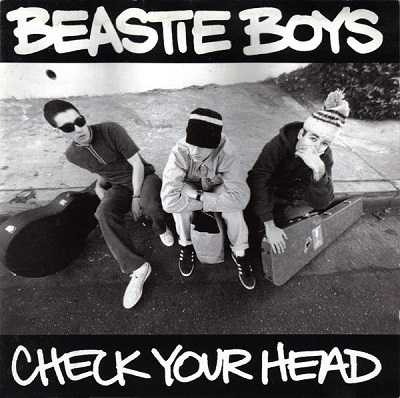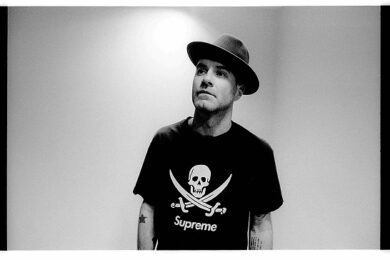6. Beastie BoysCheck Your Head

I first heard that when I worked at Honest Jon’s when Check Your Head came out and it’s when Mo’ Wax started as well. The thing with The Beastie Boys is that I’d grown up with them as a kid, you know, ‘Fight for Your Right’ and all that stuff was what I grew up on.
I was into instrumental cut-up sample hip hop tracks, hence why I did things like DJ Shadow, and they had a track called ‘33% God’, which was an instrumental of ‘Hey Ladies’. And that became this kind of classic, you know, like a party, hip hop, breakbeat track that only a few of us bought because nobody bought the fucking record. And it kind of suddenly became seminal.
They did Check Your Head and when I heard ‘So What’cha Want’, I was in LA, I think, I was DJing for Delicious Vinyl. And hearing Check Your Head was like, “what the fuck?” It was like this amazing transformation of these kids into becoming this band and you never heard that in hip hop, really. They had this wide range of influences too and this sort of DIY style. For me, you had Massive Attack in the UK and you had Beastie Boys in America. I could see the similarities – they represented similar things for me but across different continents.
And then I built a relationship with Mike and the rest of them, but particularly with Mike. There were a couple of [big] factors that blew Mo’ Wax up – Andy Weatherall supporting and Influx, and then The Beastie Boys saying that they’re coming back to the UK to play – they said they were coming back because of Mo’ Wax. They wouldn’t play the UK because Ad-Rock had been put in jail, Fight for Your Rights, in Manchester. I also supported them at their first show at the Astoria for Ill Communication. Then Mike went onto collaborate on Psyence Fiction, which was the first time we’d ever done a collaboration in that way.
Yeah, yeah, totally. I see them as a band; I think I’m in much more of a project. I would’ve liked it to have been a band, but it didn’, it just didn’t work out that way!. I think it was all about being eclectic, and pushing and pulling, and sample culture, and b-boy culture, but a bit modernist – sort of post-modern b-boyism. And it was the world that they created, Grand Royal, the label, the record. I tried to sign Luscious Jackson, that’s how I got more of a relationship with Mike. And we did Liquid Liquid and Money Mark together. We, unfortunately, were meant to do a Mo’ Wax vs Grand Royal compilation but it never happened in the end, sadly.
We had synergy with our labels, and Mo’ Wax and Grand Royal were the cool, indie, American alternative beats-led label. We all worked with Bathing Ape in Japan, the records we liked from New York; we were all into Biz Markie, Tribe Called Quest – they were part of my historical journey.
But also I was a white kid into hip hop, so there was a synergy there. Because they were one of the only really respected – at the time, pre-Eminem – white hip hop bands. They were as classic as Run-DMC, Peter Piper or whatever. These are records that were and are hip hop classics.


